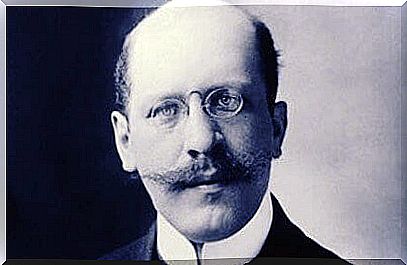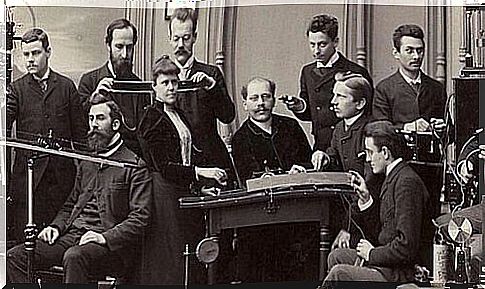Hugo Münsterberg, Biography Of The Pioneer Of Applied Psychology

There was a time when psychology was part of the realm of philosophy. However, at the end of the 19th century things began to change, especially with the arrival of a German-American scientist, Hugo Münsterberg. This psychologist was a pioneer in the application of empirical evidence and laid the foundations of applied, industrial and even forensic psychology.
Münsterberg left an immense legacy with his work as a scientist, philosopher, and psychologist. So much so, that many of today’s scientific disciplines owe their roots to this innovative-minded man, who was a disciple of Wilhelm Wundt and, later, a colleague of William James.
Many defined him as a visionary, but also as a victim. Above all because not all the renowned figures of the time wanted to give in to that scientific, creative but rigorous vision that Hugo Münsterbg proposed. He wrote, for example, numerous works to teach people to find their professional calling.
He was concerned with demonstrating how certain behaviors were actually due to brain disorders. He even established the pillars of legal and forensic psychology, helped to create the first psychological profiles and even to better understand memory processes and the figure of witnesses during judicial processes.

Biography of a visionary psychologist, Hugo Münsterberg
Hugo Münsterberg was born in Germany in 1863. His family combined a love for the arts and sciences, areas that his mother instilled in him from an early age along with music and literature. Hence, his early childhood was devoted almost exclusively to reading poetry and playing the cello.
Now, everything changed when he lost his mother at the age of 12. Later, his father followed. From that moment on, his interest in art suddenly turned to the scientific area. So when the time came, he decided to enroll in medicine at the University of Leipzig, to later continue with a career in psychology.
Wilhelm Wundt was his teacher and his mentor, the figure who would inspire much of his career. Let us remember that Wundt was known for having developed the first experimental psychology laboratory in 1879, a figure, therefore, key when it comes to giving a scientific and empirical basis to the psychological field.
Dr. Münsterberg, the most famous German psychologist in America
In 1887, Münsterberg, began to work as a professor at the University of Freiburg. It was at this time that he wrote his first book The Activity of the Will, a work that impressed William James because in some way, it came to scientifically demonstrate many of the theories of emotions that he himself defended.
It wouldn’t take long to get to know each other. It was at a psychology congress in Paris, thus initiating a close friendship, that James was fascinated by the remarkable knowledge of the young Münsterberg and by his desire to give psychology an applied character. Such was this admiration and confidence that, in 1892, he asked him to take over the psychology laboratory at Harvard.

The arrival in the United States was difficult for Hugo Münsterberg. His English was not good, but even so, figures like James McKeen Cattell went so far as to say that the young man’s work was “the most important in the United States.” His highest recognition came when, in 1898, he was elected president of the American Psychological Association (APA).
Now, it should be noted that the figure of Münsterberg was not comfortable for the entire scientific community. His German ancestry created some hostility, especially when the First World War came. He was harshly criticized, his revolutionary ideas for psychology and the world of industry were not always well received.
Moreover, some Harvard alumni even claimed that he was a German spy, thus causing Münsterberg to lose friends, colleagues and part of the prestige he had achieved.
Hugo Münsterberg died on December 16, 1916, during a conference, due to a cerebral hemorrhage. He was 53 years old .
The man who transformed psychology into a “general science of behavior”
Hugo Münsterberg’s works and perspectives made him one of the most prominent psychologists, but also, as we have noted, one of the most hated. He questioned many of the theories that were being used at that time. He criticized, for example, the work of the pedagogue and genetic psychologist G. Stanley Halls.
He pointed out that many of his studies were not correct because they were carried out by teachers and not by specialized psychologists. It was, so to speak, that critical voice that questioned the work of other colleagues because it sought a very specific goal: to make psychology a science of behavior, an empirical science, and whose results were replicable.
Let’s see, however, what were his main contributions to the world of psychology.
Contributions of Hugo Münsterberg
Münsterberg facilitated the development of applied psychology to create a very specific branch: career guidance. In his book Vocation and Learning: A Popular Reading Course, he tried to help people find their vocation, to better choose what to study and what to dedicate their professional life to.
- Münsterberg’s vocation theory is based on three dimensions: thinking, feeling and doing. In this way, each of us should, according to him, find that vocation that best suits our talents, passions and knowledge.
- Likewise, it also laid the foundations for the development of personnel selection and the field of advertising.
- On the other hand, it should be noted that Hugo Münsterberg was key to the development of forensic psychology. In fact, he participated in various trials and even developed criminal profiles, analyzing memory and perception processes, and even describing how to determine the credibility of witnesses.

Finally, it should be noted that after the sudden death of Münsterberg, some of those colleagues who had turned away from him because of his “philo-German” attitude during the war, were dismayed. Thus, figures like William Stern (who wrote his obituary) pointed out that psychology had just lost one of its most influential names.
Hugo Münsterberg contributed to give new and great possibilities to psychology. His advancements in the fields of experimental, industrial, and forensic psychology are central to many of the methods we use today.









